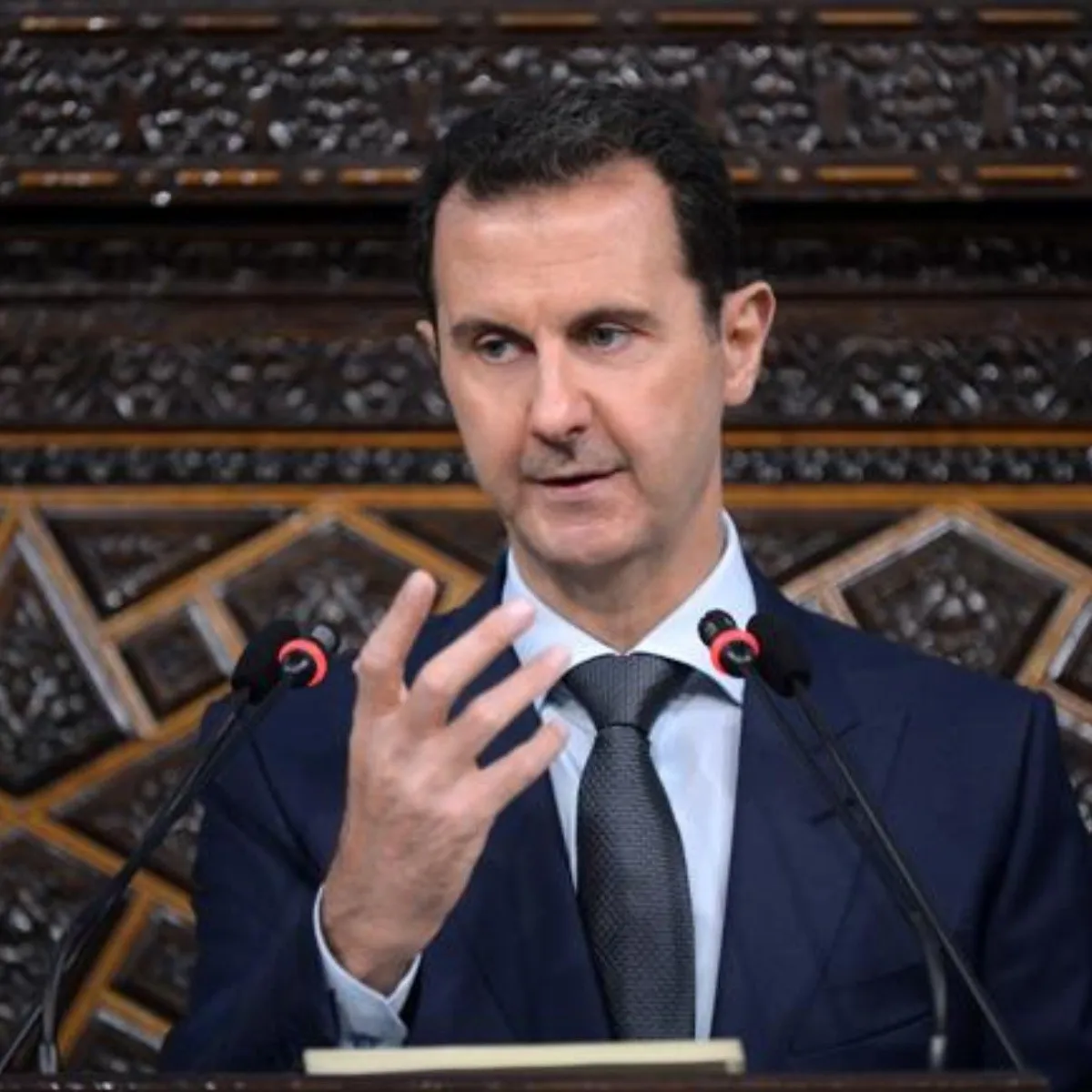Bashar Hafez al-Assad (born in Damascus, September 11, 1965) is the current president of the Syrian Arab Republic, ruling since July 17, 2000 after succeeding his father, Hafez al-Assad. He has also been the president of the Syrian Arab Socialist Ba'ath Party since July 24, 2000, also upon succeeding his father.
Al-Assad graduated from Damascus University Medical School in 1988, and began working as a military doctor in the Syrian Arab Army. Four years later, he attended postgraduate studies in London, specializing in Ophthalmology. In 1994 his older brother, Basel, was killed in a traffic accident. Bashar returned to Syria to resume his brother's role as heir apparent. He entered the military academy, and took charge of the Syrian occupation of Lebanon in 1998. In December 2000, Assad married Asma al-Assad, a computer science graduate and economic analyst at Deutsche Bank and JP Morgan.
At the beginning of his mandate, he proposed a policy of democratic change and a liberal economic opening. After 2012, he revived his liberal policies by promoting privatizations and winning new international partners such as China. He also started to promote tourism on the Syrian Mediterranean coasts.
Faced with the threat of the idea of preemptive war carried out by the US administration, the instability in Lebanon (where Syria maintained a strong military presence) and the constant tensions with neighboring Israel, Bashar al-Assad tried to have a reformist discourse that could satisfy the wishes of the European Union and the United States.
Since 2011, with the beginning of the Syrian Civil War, different Arab countries, the European Union, the United States, Turkey and other governments have demanded the resignation of Bashar al-Assad, while governments of other countries such as Iran, Russia, China, North Korea, Venezuela, Bolivia, Ecuador and Cuba condemn or do not support foreign intervention or a change of government in Syria.
Today he is still the President of Syria and the government controls the majority of the country, thanks mainly to Russian support and intervention in the war against ISIS, and is slowly being accepted by international organizations such as the Arab League and the UN, which had denounced him at the beginning of the civil war.
Megathreads and spaces to hang out:
- ❤️ Come listen to music and Watch movies with your fellow Hexbears nerd, in Cy.tube
- 💖 Come talk in the New Weekly Queer thread
- 💛 Read and talk about a current topics in the News Megathread
- ⭐️ August Movie Nominations ⭐️
reminders:
- 💚 You nerds can join specific comms to see posts about all sorts of topics
- 💙 Hexbear’s algorithm prioritizes comments over upbears
- 💜 Sorting by new you nerd
- 🌈 If you ever want to make your own megathread, you can reserve a spot here nerd
- 🐶 Join the unofficial Hexbear-adjacent Mastodon instance toots.matapacos.dog
Links To Resources (Aid and Theory):
Aid:
Theory:
now all fediverse discussion will be considered a current struggle session discussion and all comment about it are subject to be removed and even banning from the comm.
have all of you a good day/night 

Yall every think about death? Thats pretty weird right? That all the stuff that makes us us can still all be in the same place and connected the exact same way and yet everything has suddenly become completely the opposite of what it once was for us.
Its almost like we arent merely flesh, rather we must also exist in the space between where our flesh connects to and interacts with itself and the external world. Its almost like we're a dialectical system defined and continually redefined by its changing relations to itself and other things.
Maybe the universe just seems empty because humans are so focused on defining the material of the universe by conceiving of discrete individual subatomic particles that build everything, like building blocks all precariously stacked together. When we zoom in on those discrete atomized points they become infintely more detailed and smaller, and the space between them grows infinitely. But if we instead focus on the connective tissue that binds these supposed points together we find that the universe is filled to the brim with stuff. When we zoom in on those connections we dont find them becoming smaller, or growing infinitely thin, rather they become blinding in their stark density as they connect every point in the universe with every other point, no matter how distant or small.
Maybe death is like that. Maybe instead of falling between the seemingly infinitely empty spaces between our atoms, we become tangled in the threads bewteen them. Ever more entwined with the very fabric of the universe itself. Maybe the connections between particles are mirrored in the connections between people, and we continue to exist on the threads left behind in the minds of our loved ones and the people whos lives we touched, no matter how distantly or small that touch was. Just as the universe is endlessly connected with itself maybe all humans are endlessly connected with each other and by extension all other forms of life on earth and to the rest of the universe itself.